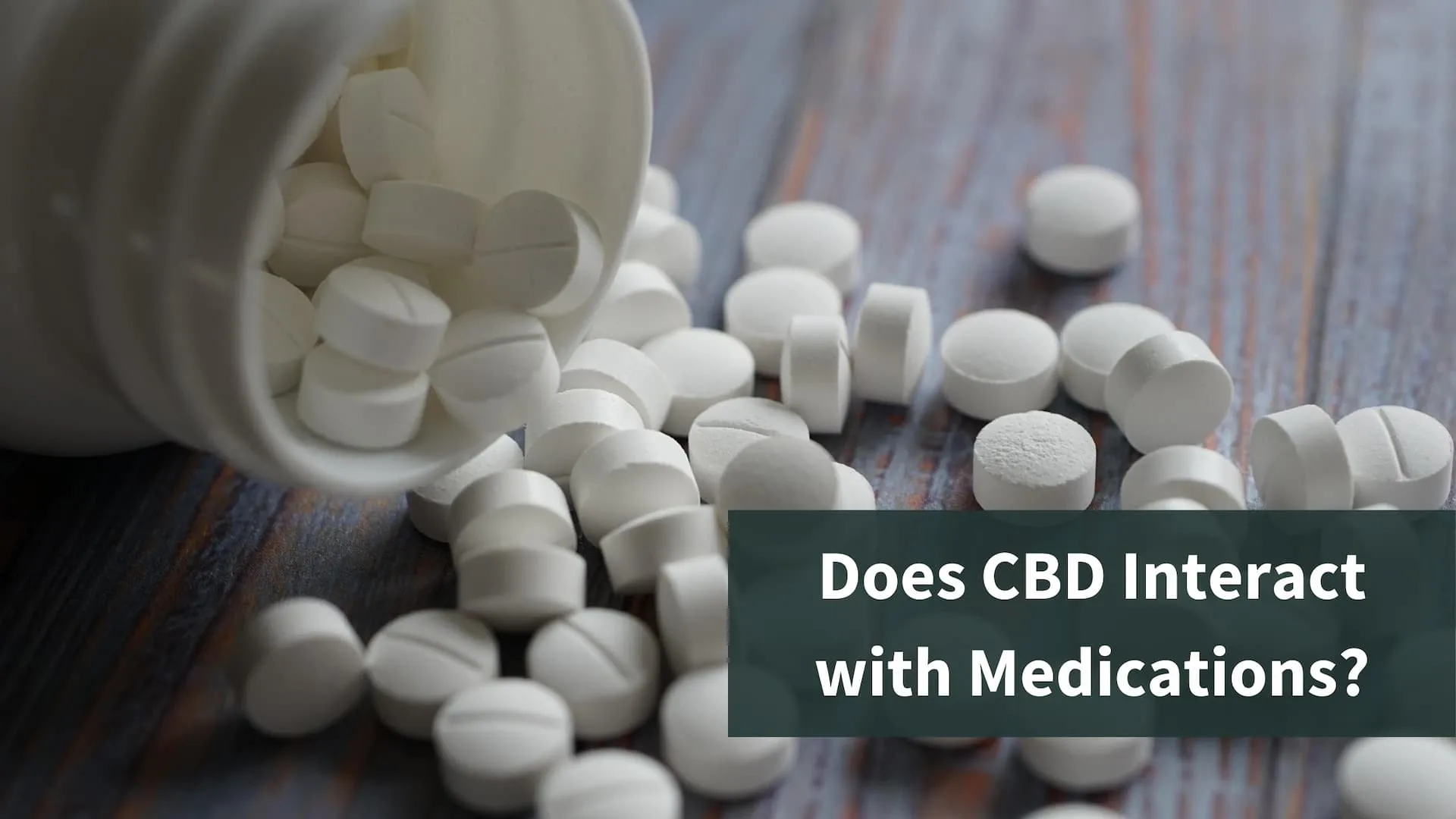No products in the cart.
How Does CBD Interact with Medications?

Key Takeaways
- CBD is a natural supplement with a generally safe use profile. However, it can interfere with a number of medications. This interaction can range from safe and mild to severe and potentially dangerous.
- If you want to start taking CBD, consult with a health professional first to discuss possible interactions and side effects. More information will help you make a more informed decision.
Will CBD Interact With Your Medication?
What is CBD?
CBD is a non-intoxicating extract from flowering hemp and cannabis plants. Classified as a cannabinoid, a naturally occurring compound found in (capital c) Cannabis Sativa L. plants, CBD has many therapeutic applications.
That said, CBD is underregulated and widely available in different strengths and forms. Because it’s a relatively new supplement, our knowledge of its interactions with other substances is limited.
In this post, we’ll do our best to inform you of CBD’s safety and provide you with resources to identify potential medication interactions.
Different Types of Medications
To better understand which medications CBD interacts with and what the side effects are, it’s helpful to identify the types of medications we’re going to talk about. Let’s start with the most gentle and work our way up.
Herbal
Herbal medications, often called supplements, are the most gentle class of medications. These supplements are derived from whole plants and can be used to address a wide range of issues.
CBD, especially when consumed as part of a full-spectrum product, is considered an herbal supplement. CBD interacts with other herbal supplements, though the interactions are generally mild.
Over-The-Counter (OTC) Medications
Over-the-counter medications are medications like ibuprofen (Advil) and acetaminophen (Tylenol) that you can purchase without a prescription at your local grocery or drug store.
Because the safety profile on these OTC medications is generally good, the interactions between CBD and OTCs are generally mild. This is assuming you’re taking both as directed.
Prescription Medications
Prescription medications cover all medications that you need a doctor’s directive to purchase. These, like all the medications described above, can address many medical issues.
CBD also interacts with prescription medications. The interactions can range from gentle to severe. If you take prescriptions, it’s best to consult a healthcare professional before you introduce CBD into your daily routine.
Will CBD Interact with Your Medication?
As mentioned in the section above, CBD interacts with just about all forms of medications, from gentle herbal supplements all the way to prescription medications. However, the severity of the interaction does change depending on the class of medication.
Because most drugs are broken down by enzymes in your liver, CBD can compete for or interfere with these enzymes, leading to too much or too little of the drug in your body. This is called altered concentration and may lead to the medication not working or an increased risk of side effects.
Does the Type of CBD Matter?
It sure does. Topical CBD products like lotions, creams, and rubs don’t enter the bloodstream enough to interact with other medications. In other words, you likely don’t need to worry about your CBD lotion interacting with your other ingested medications. However, that doesn’t mean your CBD lotion won’t interfere with your other topical medications.
Inhaled and ingested CBD (taken orally in either an oil tincture or an edible) will enter your bloodstream and can lead to the altered concentration issue mentioned in the previous section.
How to Check if CBD will interact with your medications
There is a tool published by the good folks of Penn State College of Medicine that can help you check if any of your current medications have a known interaction with CBD.
The tool is called CANN-DIR, short for CANNabinoid Drug Interaction Review and can be accessed for free.
As of this writing, they’ve identified 139 over-the-counter and prescription medications that interact with cannabinoids. Of those 139, researchers have further identified 57 medications with a known and potentially dangerous altered concentration issue.
Another tool called the Drug Interaction Checker from Medscape allows you to cross-reference CBD and other medications. If you’re concerned about herbal drug interactions, we encourage you to use this tool, as CANN-DIR does not cover herbal supplements.
How to Protect Yourself from a Bad Interaction
If you’re considering adding CBD to your daily regimen, you should first make sure that it won’t interact with your existing medications.
- Consult a health professional – The first folks you should consult before adding CBD to your day-to-day are your doctor and your pharmacist (if you have access to them). These professionals can help you navigate any potential drug interactions and recommend dosages, schedules, or if you should take CBD at all.
- Low and slow – Our second recommendation is to approach CBD cautiously. If you’re new to the supplement, don’t immediately buy the most potent product. As with many herbal supplements, sometimes less is more. We recommend starting with 25mg per dose once or twice daily, depending on your goals. Let your body get used to CBD.
- Listen to your body – We recommend that if you start taking CBD, record how it makes you feel. You can do so either with a journal or your phone’s notes app. Observe how you feel throughout the day and any side effects that may arise. You can review these notes with a healthcare professional if accessible to help you make decisions about future CBD use.
Sources
- Balachandran, Premalatha et al. “Cannabidiol Interactions with Medications, Illicit Substances, and Alcohol: a Comprehensive Review.” Journal of General Internal Medicine vol. 36,7 (2021): 2074-2084. doi:10.1007/s11606-020-06504-8
